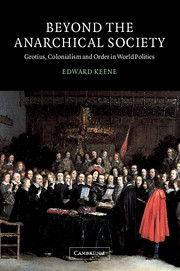Book contents
- Frontmatter
- Contents
- Preface
- Acknowledgements
- Introduction
- 1 The orthodox theory of order in world politics
- 2 The Grotian theory of the law of nations
- 3 Colonialism, imperialism and extra-European international politics
- 4 Two patterns of order in modern world politics: toleration and civilization
- 5 Order in contemporary world politics, global but divided
- Conclusion
- Bibliography
- Index
3 - Colonialism, imperialism and extra-European international politics
Published online by Cambridge University Press: 22 September 2009
- Frontmatter
- Contents
- Preface
- Acknowledgements
- Introduction
- 1 The orthodox theory of order in world politics
- 2 The Grotian theory of the law of nations
- 3 Colonialism, imperialism and extra-European international politics
- 4 Two patterns of order in modern world politics: toleration and civilization
- 5 Order in contemporary world politics, global but divided
- Conclusion
- Bibliography
- Index
Summary
It is hardly surprising that Hugo Grotius's theory of the law of nations gained its colossal popularity. As I have already noted, his account was practically tailor-made for the main Protestant powers in the Thirty Years War, in the sense that it justified their prosecution of the war against Spain and the Hapsburgs without endorsing more general theories of resistance that might have proved awkward at home; sufficient reason, no doubt, for Gustavus Adolphus's famous liking for carrying De Jure Belli ac Pacis around with him on his campaigns. The more lasting significance of Grotius's work, however, lies in its relevance to people who wanted to justify colonialism on the basis of individuals' rights in the law of nations to appropriate unoccupied or uncultivated lands, and to people who wanted to justify the assertion of public authority by European states in the extra-European world. Both practices were radical extensions of Hugo Grotius's original position, and it is by no means obvious that he would have given an unqualified endorsement to either of them, but it is nevertheless fair to say that over time an especially close relationship developed between the specific propositions of the Grotian theory of the law of nations – his ideas of divisible sovereignty and private property – and the modern practices of colonialism and imperialism. Certainly, there was more of an affinity here than there was between the Grotian theory and the practice of the ‘Westphalian’ states-system that developed within Europe.
- Type
- Chapter
- Information
- Beyond the Anarchical SocietyGrotius, Colonialism and Order in World Politics, pp. 60 - 96Publisher: Cambridge University PressPrint publication year: 2002



